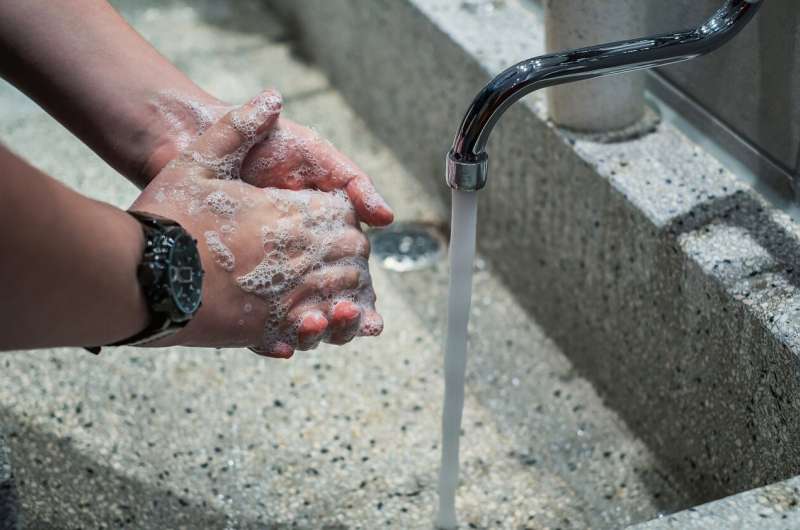Credit: CC0 Public Domain
While the end of the school year is a time for kids to enjoy the outdoors, the coronavirus pandemic has put hopes of summertime fun in doubt. Experts from Children's Hospital of Philadelphia (CHOP) held a virtual town hall on Thursday to discuss what summer activities look like in the time of COVID-19.
"Probably one of the most important things for parents right now is to figure out how to balance how to have fun and regain a little bit of more normal summer experiences, while keeping in mind that things that have not returned to normal," said Susan Coffin, Clinical Director of the Division of Infectious Diseases at CHOP.
Many parents are wondering if it is safe to send their kids to summer camps, take a family beach vacation, or arrange a playdate with others. Not all families have a choice, with some relying on summer camps for child care.
There are still things parents can do to help them enjoy summertime activities while minimizing the risk of getting and spreading COVID-19.
"Teaching your child how to wash their hands, and wash them well this can really help minimize their risk," said Katie Lockwood, a pediatrician at CHOP Primary Care South Philadelphia. "Wearing a mask can also help kids from not touching their mouths."
Another necessary measure is continued practice of some physical distancing.
"Often, outdoor play lends itself to the things that we are asking kids to do to be more separate and not close together for longer periods of time," Coffin said. "This is not the time to be on the boardwalk at the height of activity. Maybe you go to the beach early in the morning when no one is there, and return when crowds are lighter," Coffin said.
Socially distanced outside activities not only apply to summer camps, but play dates as well.
"Things where the kids can physically distance a little more like a bike ride or a hike can help them get the social interaction without worrying about kids sharing their germs," Lockwood said. "Additionally, families can limit the number of families they are doing these activities with."
Seasonal allergies, asthma, and COVID-19 can overlap in terms of symptoms especially sniffles, sneezes, or a nagging cough and parents will be wondering when should they call their child's doctor.
"If you go outside and start sneezing and coughing, and then go back outside and get better, that's probably not coronavirus," said Jonathan Spergel, Chief of the Allergy Program at CHOP. "Typically, allergies don't give you fevers, and with coronavirus you don't get itchy red eyes."
Spergel adds that masks can help protect against viruses and allergens such as dust, and another important measure is for families to take their allergy and asthma medicine.
"It will give you a sense of if things are different. If your symptoms are getting worse, it could be coronavirus, but it may not. Still, give your healthcare provider a call," Spergel said.
Families are also wondering whether they can enjoy outdoor recreational pools during the summer, but experts caution against doing so. Besides the likelihood of close contact interactions, chlorinated pools don't guarantee safety.
"I am hesitant that chlorine in pools will provide complete killing of the virus. High concentrations of chlorine may kill the coronavirus, but the concentration of chlorine in pools public or private is rarely constant," Coffin said. "The other thing that is inevitable about swimming is the amount of splashing, sputtering, and spewing of respiratory droplets. Until we have exceptionally low levels of respiratory virus activity, it may not be advisable to go to public pools."
Some families may have to rely on public transportation for their kids to go to camp, which can increase their risk, but experts emphasize the importance of precautions including wearing a mask, and instructing kids to clean their hands as they get off the bus and not touching their face while on the bus.
"If the public transportation company or camp has the luxury to keep the number of people on the bus low, then encourage kids to not sit close others," Coffin said.
Even after taking all the necessary precautions, kids and their families may encounter someone who tests positive for COVID-19.
"The next steps are to act as through you may be coming down with a COVID-19 infection. Stop interacting with larger groups and isolate. If 10 days have passed without developing symptoms, it's unlikely you've developed symptoms," Coffin said. "If they develop a fever or respiratory symptoms, that's a good time to check in with your pediatrician."
Lockwood added, "This is not the time to push away the symptoms."
©2020 The Philadelphia Inquirer
Distributed by Tribune Content Agency, LLC.
























